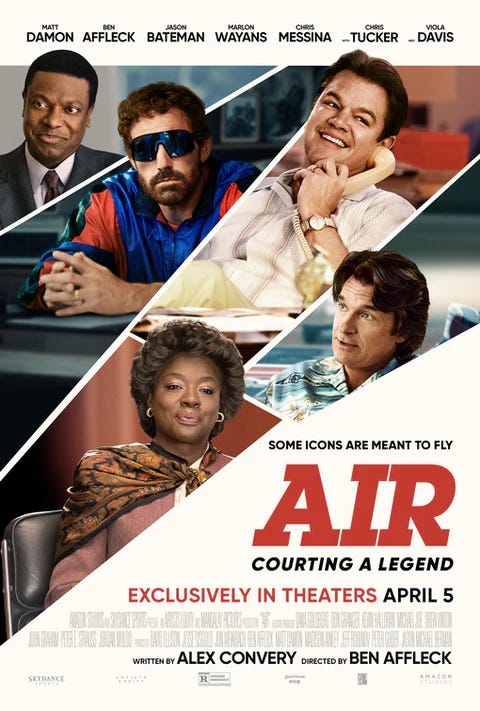The movie Air is just… air.
Under Ben Affleck's weirdly flat direction, the story of the Air Jordan feels oddly earthbound. The film bro chemistry with Damon fails to forge the fierce Nike spirit into rousing cinema gold.
I'm up in the air about the Amazon Studios production Air. Ostensibly, it's about how a scrappy––if recently turned public––Beaverton, Oregon shoe startup, Nike, lost its renegade mojo in a quest for safe quarterly profit, only to regain it through the ballsy signing of a signature talent: North Carolina Tar Heel basketball star Michael Jordan.
On the surface––where this ersatz corporate propaganda film resides––I am inclined to champion any work that celebrates American ingenuity, self reliance, and dogged determination in the pursuit of greatness. All of which is under attack by today's anti-American revisionists.
But under Ben Affleck's weirdly flat direction, the story of the Air Jordan sneaker feels oddly earthbound. In casting sports junkies Matt Damon and Affleck as Nike VP Sonny Vaccaro and founder Phil Knight respectively, the thinking must have been that their Boston film bro chemistry would alchemically forge Nike’s fierce jock spirit into rousing cinema gold. But Air is no Good Will Hunting.
Affleck is not quirky, nuanced, or mangled enough to play the strange, dark, and opaque Nike overlord. Damon’s Vaccaro––credited with signing Jordan to Nike––is played as a shlumpy, downbeat, if focused talent hack until his late-film conference room speech about how future buyers will not step into a Nike shoe with Jordan's name on it but into Jordan the man and all he represents. As Vaccaro tells Michael, “We need you in these shoes not so that you have meaning in your life, but so that we have meaning in ours.”
But what does Jordan represent? It's hard to discern since the film tells us so little. His Airness is barely heard from at all. The truth about “MJ” in real life is that he is an “avid” gambler and golfer, averse to playing the race card, and, like most elite ballers, not as successful off the court as he was on it. In Jordan’s case, that’s been particularly true in his ownership of the woeful Charlotte Bobcats.
Were it not for his transcendent on-court talent, the historic Air Jordan points deal––around which the film makes abundant social justice hay––and various other advertising spots, the former Bulls’ superstar wouldn't be a household name. But that's exactly Nike’s secret sauce: transforming pedestrian but relentlessly competitive athletes into global icons.
If explored deeper, that Nike marketing machinery––centered on Portland ad maestro Dan Wieden and his dialectic with Shoe Dog Knight––would have made for a new kind of Jordan backstory. Instead, we have this cliché sermon about how savvy black mothers make the big money decisions for the men in their lives. The hard truth is that well-intentioned but infantilizing matriarchal dominance can cause all sorts of externalities for men of color. If patterns of endemic underachievement are to be short-circuited, it starts with black men becoming men again, with all the attendant financial responsibility. And that starts with a proven formula I’ve long championed: single-sex schools, robust academic sports, training in financial literacy, and broken-windows policing.
In the end, Nike’s quietly indomitable Vaccaro is akin to plucky serial entrepreneur Ray Kroc (Michael Keaton) in the far more engaging The Founder, in which the real scandals around McDonald’s––another outrageously popular urban brand––are buried beneath a series of minor, easily digestible ones. With one exception: the core conflict of The Founder–-that Ray Kroc coopted what the McDonald’s brothers built––finds no sinister parallel in Air, a feel-good story about a white guy persuading a black mom (in an atypically one-note performance by Viola Davis as Deloris Jordan).
To not even mention the controversies surrounding Air Jordan seems derelict: the overseas sweatshops that manufacture them; the insane levels of money spent to market them; and the black-on-black crime that accompanies them are all left unaddressed. To add a gratuitous line at the end about the $2 billion that Knight (net worth: $47 billion) gave to “charity” shows how tone-deaf Air is, yet how subconsciously aware it is of Nike’s underbelly, which included short-changing the very guy, Vaccaro, who saved their basketball division.
All of that could be forgiven if Air told us more about Michael. Instead, the key insight of the film is gleaned from 18 seconds of footage from the 1982 NCAA National Championship game, in which Vaccaro sees something ultra-competitive in Jordan as Michael prepares to take the winning shot.
Yes, stars are born, not made. You have it or you don't. Jordan had it. But the other insights served up in Air are literally made of air. And the airy cliches about black culture are just too much to bear.




